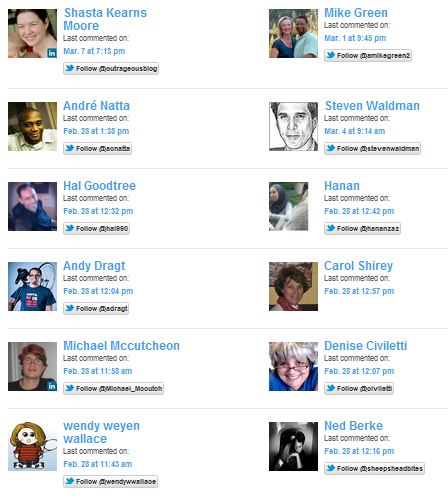Blog:
Part 2: How-tos from revenue forum bundle local and niche publisher tactics for sustainability

Check out some of the participants who joined in to share their take. The sum of the parts offered in this how-to module surfacing over two days of top notch conversation.
How-tos of basic business practices
Does managing a sales staff stretch your comfort zone? What are all the different products you offer? How much do you pay for paper clips? The content here distilled from the recent JA forum on increasing revenue, where publishers running local and niche news sites shared what they’ve learned about being small business owners.
Click on a headline to see the comment in context of the full conversation. Want to see more comments from a particular participant, see a person’s website, or follow them on Twitter? Each name links you to that person’s JA profile, with background info, expertise and ways to connect.
You might also enjoy Emerging Practices around a range of revenue options from advertising to underwriting. Philosophical Discussions surfaces deep thinking in the thread and Quoteable Moments offers smart one liners capturing some of the sentiments of publishing in this disruptive time.
How-tos topic index
Business models | Tracking demographics | Finding good freelancers | Doing or managing sales | Staying sane | Saving money | Selling new ideas
Business models
Create indispensable content & rally a fan base of ardent supporters @dgrech -successful community #publishing bit.ly/xyvaCc #JAforum
— AccelerateJournalism (@journaccel) February 28, 2012
Test your ideas
Start with some theories, go out and talk with people to test your theories. You may find some of them supported, but more likely your assumptions and theories will change. What’s great is that these are interviewing skills — core skills of journalists. The second part is seeing whether there is a critical mass of business in the answers you find. Social media may be on everyone’s mind, but are they willing to pay, and how much? And how many like-minded customers are there? You need to test those assumptions also. – Joe Michaud, business consultant
Start a for-profit community co-op
It’s sort of a reaction to the very one-sided approach of many donation-based orgs like Hawaii Public Radio, our local NPR affiliate. They take donations, but donors have no say in the governance of the org. I think that’s a problem. (And it reminds of something that Dave Winer and Jay Rosen talked about in their Rebooting the News podcast: “how public is public radio?”) So our approach is to take the position that we’re building a community institution, so it should have a democratic structure. Also, you should check out Tom Stites’ Banyan Project; they’re working on a co-op model too. – Ikaika Hussey, Hawaii Independent
But first, find out what Jason learned
We tried to launch a co-op for over a year … it didn’t work … if Ikaika – or anyone else – wants to hear more about our experience, just drop me a line at [email protected] … – Jason Pramas, Open Media Boston
Think products
We have three products right now: subscriptions to our shopping platform (do-it-yourself or with labor); contests (web and social, but we’re specifically using our contest engine for personal page to business page conversions of fan base); and a social media consulting session that includes a report showing in detail your competition’s social media market share vs. yours along with a publishing schedule/guidance on growing your customer base using social media. Our shopping platform is currently about 90% of our total revenue. The other products are only a few weeks old though and I suspect will combined contribute to 50% of our revenue base within 60 days. – Emily Lowrey, Magic City Post
Tracking demographics
On #JAforum, @Crowdscience offers free tools to help online #publishers better understand their online audience bit.ly/zMqBEb #journo
— AccelerateJournalism (@journaccel) March 6, 2012
Know its value
I wonder if even basic demographic information, maybe coupled with what kinds of content interests users, couldn’t be of some value to local businesses in a way that they would actually pay for… – Michael Mccutcheon, Journalism student at CUNY Graduate School
DIY tools
We combined an analysis of Google Analytics data and a survey (being on a low budget we used Survey Monkey so were limited to 10 questions). We actually got quite a bit out of that and published the results on Talk of the Sound along with our rate card (under the advertise link on our home page). – Robert Cox, Talk of the Sound
Budget buys
There’s a lot you can do on a small budget. Quantcast.com can give you demographic data on your readers. CrowdScience.com can really take it to the next level. In the magazine world, BPA and ABC are both doing a ton of digital audits. Having said that, I think trend in purchasing is that’s being done is through exchanges. Audits seems like less of a concern, as they can test data/inventory and see how it performs. – eMedia Vitals
Free start
Our free WHO tool uses questions created by the experts on our market research team, so you’ll get better results than writing your own questions through something like SurveyMonkey. The questions cover age, gender, education, income, country, household landscape (kids, relationship status, etc.), plus up to 3 interest-based questions and an option for site feedback. We also use statistical sampling to invite site visitors to the survey, so you’re not bugging every visitor on your site with a survey. As eMedia Vitals says, you can take it to the next level with our paid products, but WHO is a great way to get your feet wet for no cost. – Crowd Science
Finding good freelancers
4 tips from for finding talented #freelancers: bit.ly/wSeFBZ (from @shanesnow of @Contently on #JAforum)
— AccelerateJournalism (@journaccel) February 29, 2012
Employ patience
Finding qualified freelance reporters to cover health policy issues has been a continual struggle. Usually people who are the most qualified also demand the highest dollar amount. You need a lot of patience and need to find people who are willing to learn and don’t mind being edited at first — in the long run it pays off. I’ve had people working for me since I began this web publication three years ago and they’ve come a long ways since they started out. – Diane Lund, The Lund Report
Pay by the day
If you have money, you do tend to get better quality for more money. That said, none of us have a lot of money to pay freelancers, I am betting. So what we do is find a good one and pay them by the day, rather than by word or story. That way, they know they get a fair wage, and they know what it is. If it works out, we pre buy a certain number of days per month–so that helps them pay their bills, etc, gives a steady outlet, and so forth. And if that works out, we also give them some options–so that they have a bigger stake in our success and are part of the team. – Bob Buderi, Xconomy
Tips from a freelance database creator
- Finding good people is a pain. Sorting through the noise is tough (hence building what we’ve built)
- Advertising for freelancers on MediaBistro and JournalismJobs yields better results than Craigslist or blogger-focused boards like ProBlogger.
- You get what you pay for.
- If you want freelancers who don’t require a lot of editing, make sure you talk to their previous editors. Don’t be wooed by just the names of publications they list; get into the weeds of their actual clips. – Shane Snow, Contently
Doing or managing sales
The creative conundrum
I think one of the fundamental lessons that’s emerging is that it’s nearly impossible to make a living solely creating content. If you’re an independent, you need to do things like throw events or sell ads. The conundrum is most of us aren’t in the news business to organize events or sell ads… Increasingly, I feel like news is becoming part of the “gift economy” (http://en.wikipedia.org/wiki/Gift_economy) – Dan Grech, WLRN
Take the plunge
I dont think local news startups can afford to hire quality journalists AND quality salespeople AND make money. But if someone with a journalism background is passionate enough about their mission I would encourage them to try to get over the sales reluctance. People buy people. – John Garrett, Community Impact Newspaper
Give the pipeline time
I’m the “sales guy” and though I received a base pay to start and ongoing advances against commissions, my compensation will eventually be all commission. A sales pipeline takes time and hard work to build and you will need to provide that time (via some sort of compensation) or you will not keep a sales person long enough to see success. We are 4 to 5 months in and are just now seeing results at all levels and I have many accounts that I expect to take 6 months to close (site wide underwriters waiting for mid year budget renewals). We’re also very interested in what Emily Lowrey is up to but some folks around these parts have a sort of allergic reaction to the shopcity look and feel… no easy answers. – Andy Dragt, The Rapidian
Hire young
We placed ads on college job boards and hired recent graduates into commission-only roles. This was a good target for us because Gen Y is more likely to live at home with their Parents, and more likely to work on passion projects. We have a pretty baked out sales training program, so after a Rep goes through that then they have monthly goals, sales pipelines and attend regular meetings, etc. I will say, though…learning experience for me. I got the whole ‘building culture’ piece, but I wasn’t prepared to work solely with Gen Y’s like I am now. It takes some getting used too since I come from a 1st generation college-student, working class background and I’m just wired differently because of that. We’re seeing lots of progress and some pretty good revenue now, but I know we have a long road ahead of us. – Emily Lowrey, Magic City Post
More Magic City details
We’re commission only right out-of-the gate. We’re currently at 20% straight commission, but we are modifying our model to increase commissions to 25% when Reps hit pre-determined revenue targets by Rep with another bonus if the group makes their goal. We do the full enchilada: sales prospecting, lead generation/referral, needs analysis (consultative selling), sales call, closing & account maintenance. In addition to that, we do product-specific and industry training. For example, we don’t sell a daily deal but we all know about the daily deal sites locally and nationally and the upsides and downsides to them. We also have a lot of training and conversation around servicing small business customers, and we do a few other onboarding things to build our culture in general. Our Reps also understand a lot about social media tie-ins to digital marketing campaigns, and we do that through group training during our sales meeting each week. We have a learning culture. – Emily Lowrey, Magic City Post
Staying sane
#Publishers: would you say the intensity of the work is a bigger hurdle than the #revenue? @emilygharris #JAforum #Jpreneur #jbiz
— AccelerateJournalism (@journaccel) February 28, 2012
Divide up the day
In the initial couple of start-up weeks when it was only me, I divided up my day into parts (and also my week) and schedule time to get all the necessary functions completed. Monday mornings were a bit of catching up before diving into sales calls and then Tuesday was all day setting appointments for the remainder of the week. On Wednesday, I worked on community building and went on appointments and Fridays were for planning the next week/generating ideas/learning. Each day had elements of the total job, but I tried to keep my focus on that particular day on the task at hand. It’s not easy by any means though… Some days, I am on my game like nobody’s business. Others, I’m just plain exhausted. I miss the “atta girl’s!” I used to get working for someone else. Now, when I complete a project, it comes from a way more pure place though…and I get to work on things that matter to the future of my business…so that’s always awesome. When it’s your responsibility to motivate yourself, it becomes about far more than just organization of your day, but about keeping your energy up. I’ve changed my diet and only eat locally-grown foods now, and I walk around the park and meditate. Purposefully taking care of myself and also setting a schedule for certain types of tasks has helped. For example, I do the books on Saturday mornings. I’m alert, well-rested, and when I’m done…it’s a reward to go out and have a few hours to do something non-work related. There’s no way I can get my books done during the week when my folks are here. – Emily Lowrey, Magic City Post
Saving money
Save everywhere possible
Do you have to spend money to make money? Abso-freakin’-lutely. However, I want to hear the argument for buying another box of paper clips when it works just as well to fold the corner over. I’m lucky. I’m an extraordinary cheapskate (genetic). My business manager is not. That means he’s always making purchasing requests, and he has to justify every one to me, and things only get bought if I see a value in it. And, yes, we do fight over paper clips. – Ned Berke, Sheepshead Bites
Selling new ideas
Pre-sell the concept
What we TRY to do is come up with a concept and then pre-sell it, so we don’t push ahead unless we know our costs are covered. We are fortunate to have some great underwriters who will take a chance on new things. They know they get a lower cost of entry if they come in early. The same when we go into a new city: we won’t go unless we have circled enough up front business to pay for one year… Usually we mock it up and show it to folks who seem most likely to be interested in it and describe what we have in mind. – Bob Buderi, Xconomy
Do more with supporters
Get someone that believes in your reporting that’s willing to take a risk – we’ve had great success getting small grants from Northwest Health Foundation for our work, for example, and they never shadow what we’re doing – we’ve developed a strong trusting relationship which has worked well. – Diane Lund, The Lund Report











Weigh In: Remember to refresh often to see latest comments!
0 comments so far.